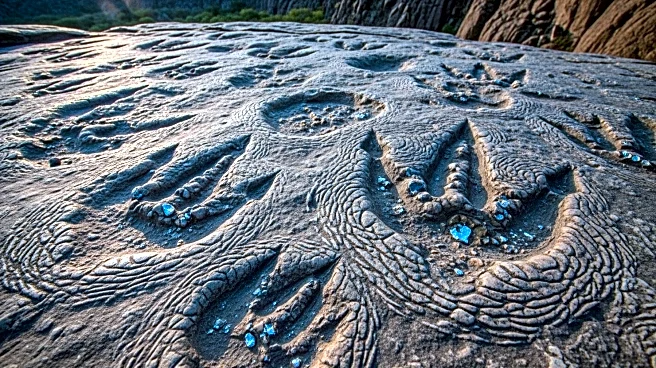What is the story about?
What's Happening?
A study conducted by researchers at Curtin University, published in the journal Geobiology, has revealed new insights into the preservation of prehistoric coprolites, or fossilized feces. These coprolites, some dating back 300 million years, provide valuable information about the diets and ecosystems of extinct animals. The research focused on samples from the Mazon Creek fossil site in the United States, known for its exceptional fossil preservation. The study found that microscopic grains of iron carbonate, rather than phosphate minerals, play a crucial role in preserving delicate organic molecules within these ancient feces. This discovery challenges previous assumptions and suggests that iron carbonate acts as protective capsules, safeguarding biomolecules from decomposition over millions of years.
Why It's Important?
The findings from this study have significant implications for paleontology and the understanding of prehistoric life. By identifying iron carbonate as a key factor in biomolecule preservation, researchers can refine their methods for fossil hunting, focusing on specific rock types that may contain molecular clues. This approach not only aids in discovering more fossils but also enhances the reconstruction of ancient ecosystems. The molecular data preserved in coprolites allows scientists to gain a deeper understanding of the behaviors, diets, and environmental interactions of extinct species, offering a more comprehensive view of past life on Earth. This research elevates coprolites from mere curiosities to valuable scientific resources, potentially unlocking new insights into the ecological dynamics of prehistoric times.
What's Next?
The research team plans to expand their analysis to coprolites from various species, environmental conditions, and geological periods to further explore the relationship between iron carbonate and biomolecule preservation. This broader investigation aims to confirm the recurring pattern observed in different coprolite samples and solidify the role of carbonate minerals in preserving biological information throughout Earth's history. As researchers continue to refine their fossil hunting strategies, they may uncover more molecular data that can transform our understanding of ancient ecosystems and the evolutionary history of life on Earth.
Beyond the Headlines
The discovery of iron carbonate's role in preserving coprolites opens up new avenues for ethical and cultural considerations in paleontology. By focusing on molecular data, researchers can reconstruct not only the physical appearance of extinct species but also their behaviors and interactions, providing a more holistic view of prehistoric life. This approach may lead to a deeper appreciation of the complexity and interconnectedness of ancient ecosystems, highlighting the importance of preserving biodiversity and understanding the long-term impacts of environmental changes.
















